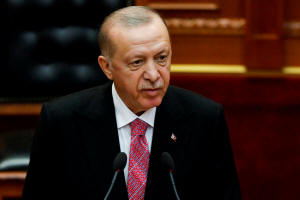NATO member Turkey, opposed to sanctions, in bind over Ukraine
 Send a link to a friend
Send a link to a friend
 [February 22, 2022]
By Tuvan Gumrukcu and Ece Toksabay [February 22, 2022]
By Tuvan Gumrukcu and Ece Toksabay
ANKARA (Reuters) - When Russian President
Vladimir Putin announced his decision to recognise two breakaway regions
in east Ukraine as independent, NATO member and Black Sea neighbour
Turkey swiftly criticised the move, but stopped short of announcing any
punitive measures.
Turkey is in a unique bind: it has good ties with both Ukraine and
Russia, but also opposes sanctions in principle, just as the West is
poised to slap them on Moscow as long promised.
The crisis leaves President Tayyip Erdogan balancing those diplomatic
relations along with his duties within NATO, while also protecting
Turkey's beleaguered economy from back-to-back shocks after a currency
crisis in December.
Any step too far against Moscow, and Ankara risks upsetting important
Russian energy supplies, trade and tourism, analysts say.
"It is the prospect of a prolonged bloodless conflict or substantive
sanctions on Russia's energy exports that could hurt Turkey deeply (and
threaten) economic stability," said Atilla Yesilada, Istanbul-based
analyst at GlobalSource Partners.
Striking the balance Turkey employed for decades, Erdogan often
highlights his friendship with Putin but has warned Russia against an
invasion and offered to mediate the crisis. He has also criticised the
West's handling of things as a hindrance to peace.

On Tuesday, Turkey called Russia's recognition of Ukraine's separatists
an unacceptable violation of Ukraine's territorial integrity. Ergodan -
who visited Kyiv this month - rejected it and called on parties to
respect international laws, likely his sharpest language towards Moscow
since a crisis over Turkey's downing of a Russian jet near Turkey's
Syrian border in 2015.
Erdogan and Putin have since warmed and Turkey bought Russian missile
defences in 2019, which prompted U.S. anger and sanctions. Since then,
Ankara has opposed sanctions against any country.
"Sanctions against Russia are useless. You only postpone the problems,"
Turkish Presidential Spokesman Ibrahim Kalin told Die Welt at the
weekend, adding "new rules and principles" were needed for both Russia
and the West to "feel safe".
"Russia feels threatened by NATO," he added.
[to top of second column]
|

Turkish President Recep Tayyip Erdogan delivers his speech at the
Albanian Parliament, in Tirana, Albania, January 17, 2022 REUTERS/Florion
Goga/File Photo
 While cooperating with Russia in
energy and trade, Turkey has also sold sophisticated drones to
Ukraine and inked a deal to co-produce more, angering Moscow.
Complicating diplomacy, Turkey opposes Russian policies in Syria and
Libya even as it forges cooperation on the ground there. It also
opposes Russia's 2014 annexation of Crimea, and its recognition of
the Abkhazia and South Ossetia regions in Georgia as independent.
VULNERABLE LIRA
Russia supplied some 46% of Turkey's gas last year, and Ankara is
looking to strike shorter-duration gas deals with Moscow to relieve
import costs. Inflation has soared to near 50%, hurting Erdogan's
poll standing, after the lira crash.
The currency slipped to its lowest since mid-January on concerns
over economic fallout including for Turkey's tourism sector, for
which Russians are the top arrivals.
Without elaborating, Erdogan has said Turkey will do what is
necessary as a NATO member in the event of a Russian invasion.
The 1936 Montreux Convention gives Turkey control over the straits
within its borders, and during peacetime guarantees access for
civilian vessels to and from the Black Sea. It also limits access of
naval warships, helping to protect the Black Sea from militarisation.
Can Kasapoglu, director of security and defence studies programme at
EDAM, said Turkey had made clear it backs Ukraine. But a Russian
troop buildup in the Black Sea should "really worry" it, especially
the risk of a change of leadership in Ukraine, he said.
"In this case, defence technology cooperation with Turkey may be
suspended, as Russia is uncomfortable with a NATO nation's defence
technological and industrial base developing ties with the
post-Soviet space," he said.
(Additional reporting by Daren Butler and Can Sezer in Istanbul;
Editing by Jonathan Spicer and Peter Graff)
[© 2022 Thomson Reuters. All rights
reserved.] This material may not be published,
broadcast, rewritten or redistributed.
Thompson Reuters is solely responsible for this content. |